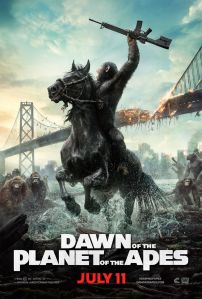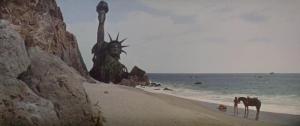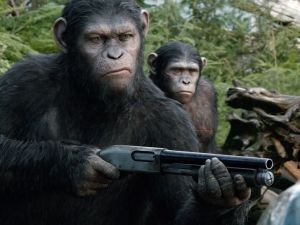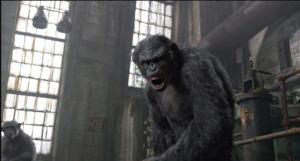
2011's "Rise Of The Planet Of The Apes" was the pleasant summer blockbuster surprise of that year. I did not expect much from that movie, as the premise of a group of apes taking on the modern-day military in the heart of San Francisco seemed laughable at best. Yet, at its heart, the film was able to tell a wonderful story about overcoming inferiority and the downfall of man, with some touching performances by Andy Serkis and James Franco.
Part of the appeal of the "Planet Of The Apes" franchise, at least to me, is how much more clear our own flaws become when the tables are flipped. The original 1968 film was wonderful at doing just that, by having the apes be driven by keeping the image of their world in tact, even if that means destroying evidence that would jeopardize that image.
It also really helped that the 1968 film was co-written by Rod Serling, the creator and script writer for "The Twilight Zone." When you put it in that perspective, suddenly the movie feels like an hour and half long episode of the show and with a bigger budget. Even down to the twist ending.

That ending makes "Planet Of The Apes" an anomaly in its own franchise, as every next film is built upon the twist that the planet "where apes evolved from men" was Earth all along. Sorry to spoil the movie for those who haven't seen it, but you probably knew that twist before you could talk.
The newest film in the franchise, "Dawn Of The Planet Of The Apes," finds itself in a middle ground where humans are no longer in control of the planet, but apes have not fully risen to conquer it. While building off of the premise of the earlier ape film, this new one also adds depth and complexity of its characters, showing that the ape civilization is not that perfect.
Set ten years after the events of "Rise Of The Planet Of The Apes," the majority of the human population has been wiped out due to an airborne virus that also gave the apes their increased intelligence. Now a massive population of apes have amassed near San Francisco and have begun to live peacefully, with Caesar (Andy Serkis) as their leader, and believing that all humans are long gone.
Things change though when a hunting party stumbles across a small group of humans with guns, threatening to shoot every last ape. The humans flee when they realize how many apes there are, and Caesar finds out that a large group of humans have gathered in downtown San Francisco for refuge and are running out of power. A nearby dam, in ape territory, can give these humans a chance to survive, but Caesar and his followers are unwilling to let those damn dirty humans near it.

If there was one complaint I had with "Rise Of The Planet Of The Apes," it was that it tried far too hard to glorify the apes and make humans look terrible. It was to show that we weren't as capable as we thought we were and that apes were caring creatures too, but the film really over sold that. It works better in more subtle ways and that film was about as subtle as a train wreck.
"Dawn Of The Planet Of The Apes" finds a nice middle ground where it shows the good and bad of both cultures. Both can be caring, nurturing, selfless and courageous, like fighting off a bear to protect your son or saving a dying ape with antibiotics. But each group can also jump to conclusions, be selfish, greedy and power-hungry, like Caesar's second in command, Koba, constantly trying to overthrow him just to take his anger out on humans.
It makes both humans and apes easier when they're shown to be sympathetic to others, but also be flawed and hasty when making tough decisions. It leaves Caesar at an cross-road where he can see the good in humans, but also the bad in his own kind, and thus the evil in himself. That his pride and arrogance blinded him to Koba's need for revenge.

Like the previous film, the special effects work in this film is awe-inspiring. Rather than copy-and-pasting the same models of apes into the background, it has been said that each ape had its own human model pose for body movements and textures, which then had to be made to look like apes, gorillas and orangutans. That is quite impressive when you consider there are well over a thousand apes in this movie.
This also goes together with Andy Serkis' performance. Most people will remember Serkis as Gollem from "The Lord Of The Rings" movies. Serkis has essentially created his own form of acting, where he will give the live action performance in a high-tech suit, complete with exaggerated movements and gestures, and then have a team of computer artists and designers create a non-human character around Serkis' performance.
Think of it like a Ray Harryhausen stop-motion creation, only with an actor inside of the clay.
Caesar has a gentle kindness to him that makes others want to be around him and trust him, but also an intensity and fierceness that is unmatched, that makes him a born leader. It is because of Serkis' performance and the rivalry between Caesar and Koba that makes this film exciting to watch.
The film does tend to drag at times though, especially near the end. It seems to retread the same ground of couple times when Koba has to ask for Caesar's forgiveness or we get a speech from Gary Oldman's character about how the apes are only animals.
Overall, "Dawn Of The Planet Of The Apes" was a well crafted and respectable sequel to its predecessor. The characterizations of humans and apes in a time of doubt and violence was handled perfectly, the special effects were put to good use, and the journey of Caesar's character makes the film worth watching again. It has pacing problems which hold it back from being as good as "Rise Of The Planet Of The Apes" but this was still a fun ride.
Final Grade: B

1 comment:
I agree with your main themes, and I thought it was rather well done for a piece of obvious escapism.
Post a Comment